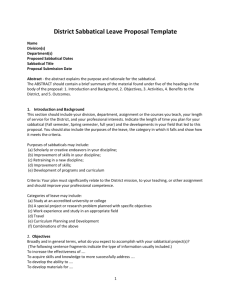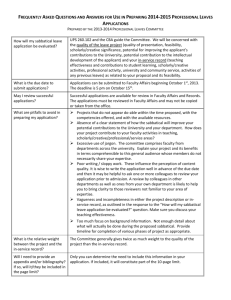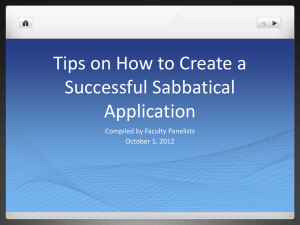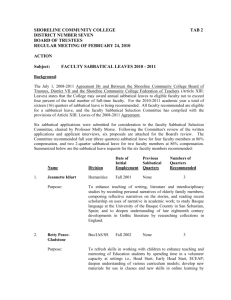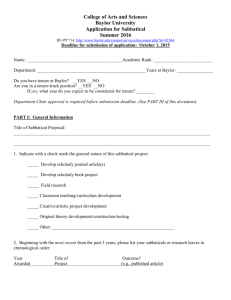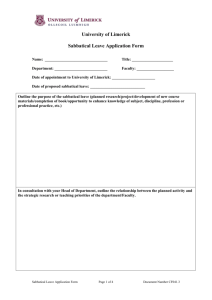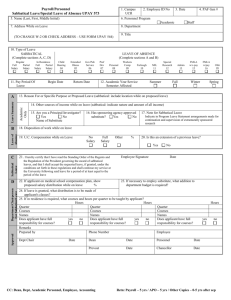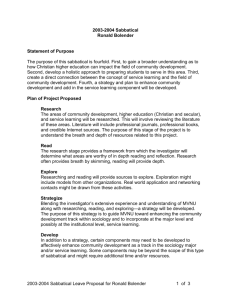procedures for leave of absence and sabbatical leave
advertisement
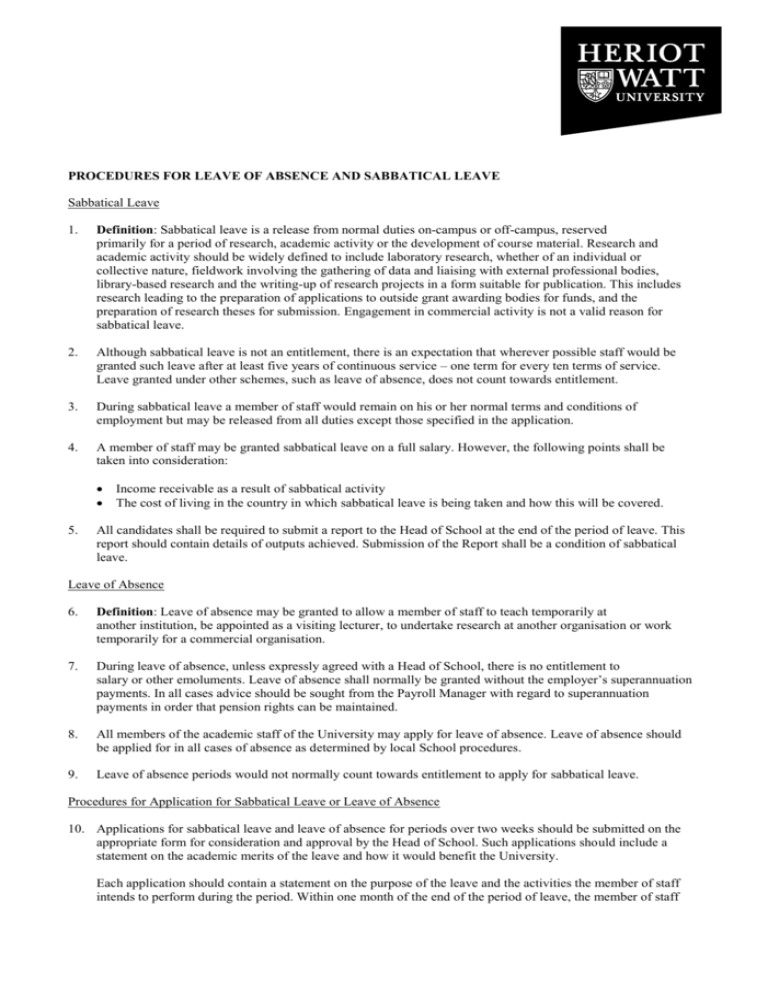
PROCEDURES FOR LEAVE OF ABSENCE AND SABBATICAL LEAVE Sabbatical Leave 1. Definition: Sabbatical leave is a release from normal duties on-campus or off-campus, reserved primarily for a period of research, academic activity or the development of course material. Research and academic activity should be widely defined to include laboratory research, whether of an individual or collective nature, fieldwork involving the gathering of data and liaising with external professional bodies, library-based research and the writing-up of research projects in a form suitable for publication. This includes research leading to the preparation of applications to outside grant awarding bodies for funds, and the preparation of research theses for submission. Engagement in commercial activity is not a valid reason for sabbatical leave. 2. Although sabbatical leave is not an entitlement, there is an expectation that wherever possible staff would be granted such leave after at least five years of continuous service – one term for every ten terms of service. Leave granted under other schemes, such as leave of absence, does not count towards entitlement. 3. During sabbatical leave a member of staff would remain on his or her normal terms and conditions of employment but may be released from all duties except those specified in the application. 4. A member of staff may be granted sabbatical leave on a full salary. However, the following points shall be taken into consideration: 5. Income receivable as a result of sabbatical activity The cost of living in the country in which sabbatical leave is being taken and how this will be covered. All candidates shall be required to submit a report to the Head of School at the end of the period of leave. This report should contain details of outputs achieved. Submission of the Report shall be a condition of sabbatical leave. Leave of Absence 6. Definition: Leave of absence may be granted to allow a member of staff to teach temporarily at another institution, be appointed as a visiting lecturer, to undertake research at another organisation or work temporarily for a commercial organisation. 7. During leave of absence, unless expressly agreed with a Head of School, there is no entitlement to salary or other emoluments. Leave of absence shall normally be granted without the employer’s superannuation payments. In all cases advice should be sought from the Payroll Manager with regard to superannuation payments in order that pension rights can be maintained. 8. All members of the academic staff of the University may apply for leave of absence. Leave of absence should be applied for in all cases of absence as determined by local School procedures. 9. Leave of absence periods would not normally count towards entitlement to apply for sabbatical leave. Procedures for Application for Sabbatical Leave or Leave of Absence 10. Applications for sabbatical leave and leave of absence for periods over two weeks should be submitted on the appropriate form for consideration and approval by the Head of School. Such applications should include a statement on the academic merits of the leave and how it would benefit the University. Each application should contain a statement on the purpose of the leave and the activities the member of staff intends to perform during the period. Within one month of the end of the period of leave, the member of staff shall submit to the Head of School a report indicating whether or not the purpose of the leave has been achieved and a summary of the outputs. 11. In considering applications for sabbatical leave and leave of absence, the Head of School should take into consideration the University’s Policies on Conflict of Interest, Intellectual Property Rights and Confidentiality. 12. Reporting: All applications for sabbatical leave and leave of absence exceeding four weeks, whether successful or not, should be reported annually to the Senate Business Committee for information. Heads of Schools should inform applicants in writing of the outcome of applications. The Director of Human Resources and the Payroll Manager should be consulted with regard to any financial and contractual arrangements for leave, and should be advised once leave has been granted (by copy of confirmation letter). 13. Arrangements for salary, superannuation and national insurance contributions during such leave shall be stated in the application and must be agreed with the Director of Human Resources and the School Financial Controller as well as the Head of School. 14. The precise dates for the beginning and end of a leave period should be agreed with the Head of School. 15. Arrangements to cover University duties must be agreed by the applicant and the Head of School. Staff on sabbatical leave or leave of absence should be relieved of all administrative duties at School and University levels, except where they can be continued without distraction from the agreed programme for which the leave has been granted. Membership of staff of committees or other bodies of the University to which they have been elected, co-opted or appointed should be considered as part of an application for leave. Normally such membership should be held in abeyance during a period of leave. Holders of external research grants will be expected to make arrangements for their satisfactory administration during the period of leave. Staff should normally be relieved of all teaching duties with the possible exception of the supervision of research postgraduates. 16. The Head of School must be satisfied that during sabbatical leave or leave of absence, the academic work and the business interests of the University and School shall not be unreasonably impaired. 17. A member of staff on such leave shall not undertake remunerated employment elsewhere (except as stated in the application for leave). 18. The maximum period of sabbatical leave granted at any one time to a member of academic staff shall not exceed twelve months. The maximum period for leave of absence shall be 24 months. 19. Sabbatical leave and leave of absence are recognised as periods of continuous service in the employ of the University. 20. Applications shall normally be made on the appropriate form at least six months before the first day of the period for which leave is sought. Applications to be submitted less than six months in advance may be made in exceptional circumstances. 21. A member of staff taking such leave away from their normal place of work shall be responsible for organising and funding travel, accommodation, maintenance and other associated expenditure from outwith the University. Arrangements for covering such costs must be included in the authorised application. 22. If a member of staff is not granted permission by the Head of School to undertake sabbatical leave or leave of absence, the member of staff may appeal against the decision through the Grievance Procedure described in Ordinance 41. If the appeal is unsuccessful, the applicant may not apply again for leave within six months from the date of refusal of the previous application by the Head of School. 23. Applications for sabbatical leave or leave of absence made by a Head of School or Dean shall be considered by the Principal. 24. Insurance: The University’s travel insurance policy provides cover for all employees undertaking Universityapproved business. All staff must ensure that they provide details of their travel to their School Insurance Coordinator and that they have obtained a copy of the current insurance information booklet and a medical emergency card. Details of all policy exclusions are provided in the Travel Insurance Guide. Prior to all travel outwith the UK staff are advised to review the guidance and advice provided by the Foreign and Commonwealth Office (www.fco.gov.uk). 2 All staff who undertake work for a commercial organisation outwith the UK must ensure that they are adequately insured by the organisation for the duration of their work. The University in approved cases can request an extension to University liability cover provided that prior notification has been given to the Insurance Section, Finance Office. Notification must be made at least ten working days in advance of any required extension. 25. Staff who take sabbatical leave or leave of absence without following these procedures and/or without permission will be subject to the relevant disciplinary procedure. 26. Members of staff other than academic staff may apply for sabbatical leave or leave of absence. Such applications should be submitted to the appropriate Head of School or Section. Such applications will be considered on an individual basis by the Secretary of the University. 27. The School should submit annually to the Senate Business Committee a report detailing periods of sabbatical leave and leave of absence which have been approved. 28. The procedures apply to all absences not covered by other categories of absence. Stewart Smith Approved by the Senate Council 28 October 2004 newguidelinesapproved.loasabb.ss 3
